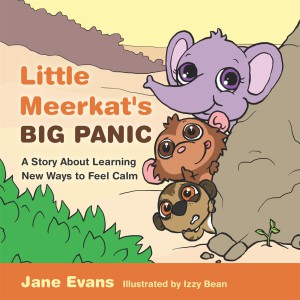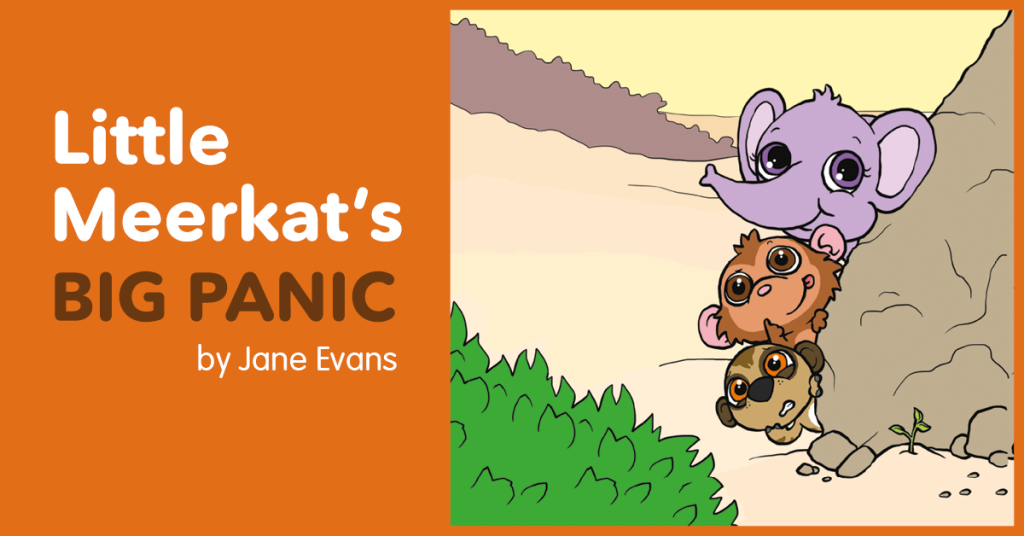Little Meerkat’s Big Panic follows three adorable animals that represent the three main areas of the brain, and how they can work together to manage anxiety. In this blog post bestselling author Jane Evans talks about the alarming rates of young children being prescribed psychiatric drugs, as well as her brilliant TEDx talk.
Little Meerkat has a VERY important job to do which creates a level of anxiety! This story describes how anxiety plays out in both Little Meerkat’s body and the brain, and what can be done to help young children gradually learn to recognise anxiety and to feel able to manage it for themselves. The three adorable animals in the story are in fact the three main areas of the brain, which children discover at the end.
As someone who has worked extensively with highly anxious children, young people, parents and carers, I am familiar with how anxiety presents in a range of behaviours, such as difficulties settling to concentrate which can make learning hard to access, dramatic emotional outbursts over seemingly every day challenges, eating problems and difficulties making and maintaining friendships, and repeat physical ailments and illnesses.
In my TEDxBristol talk, ‘Taming and Tending Your Meerkat Brain’, I addressed childhood anxiety, how it is impacting children, adults, and even babies and what that looks like in daily life. I created a slide with some findings on medication levels in the USA which are beyond shocking and concerning.
According to IMS Health’s Vector One: National and Total Patient Tracker Database for 2013 these are the figures for 0-1 year olds being prescribed psychiatric drugs:
Drug Class: Age Group: Number of People:
All Psychiatric 0-5 Years 1,080,168
Drugs
Breakdown:
0-1 Years 274,804
2-3 Years 370,778
4-5 Years 500,948
6-12 Years 4,130,340
13-17 Years 3,617,593
Grand Total 0-17 Years 8,389,034 kids on psychiatric drugs
SOURCE: IMS, Vector One: National (VONA) and Total Patient Tracker (TPT) Database, Year 2013, Extracted April 2014
In the UK we also have cause for concern as statistics from Young Minds clearly show:
- The proportion of 15/16 year-olds reporting that they frequently feel anxious or depressed has doubled in the last 30 years, from 1 in 30 to 2 in 30 for boys and 1 in 10 to 2 in ten for girls.[xxii]
- Nearly 300,000 young people in Britain have an anxiety disorder.[xxiii]
- Children with generalised anxiety disorder and those with depression had the most days away from school – a quarter had had more than 15 days absence in the previous term.[xxiv]
The good news is that we can all learn to be less anxious especially as children. Their developing brains are forming at a rapid rate and can take on board simple, effective strategies they can use for the rest of their lives!
In Little Meerkat’s Big Panic we see that when the three animals work together, and use some breathing, rocking and humming, they are soothed. This mirrors what happens to the body and brain as the survival system, which leaps in to action and reaction when we feel anxious, responds well to simple rhythm and the right kind of deep breathing.
Children’s mental health is the foundation of all that matters in their childhood but also as they grow into young people and adults. It is something we all need to pay serious attention to as pressure on children is growing, so equipping them for it is essential and empowering and will help them to access their full potential in all areas of their life.
Jane Evans is a Childhood Anxiety & Parenting Specialist, a TEDx and International Speaker, Trainer, TV and Radio Expert. Jane has worked with JKP on her previous titles: How Are You Feeling Today Baby Bear?, and Kit Kitten and the Topsy-Turvy Feelings

£9.99
Available now
